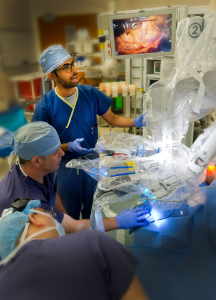“While the goals seem lofty, they are within reach.” —Dr. Uma Duvvuri
Advancements in personalized medicine are changing the way scientists and clinicians are studying and treating cancer, particularly of the head and neck variety, at the University of Pittsburgh School of Medicine.
Personalized medicine is broadly defined as an approach to medicine in which physicians use diagnostic tests combined with a patient’s genetic information to determine a particular treatment strategy that fits that patient and offers them the highest chance of success, while also determining which treatment strategies will not be worth pursuing. In theory, this individualized patient-centered approach leads to more accurate diagnoses, earlier and more effective intervention, and more efficient drug therapies.
“The promise of personalized medicine is for patients to have the right treatment, for the right problem, at the right time,” says Uma Duvvuri, MD, PhD, an associate professor in the Department of Otolaryngology and the Medical Director of Pittsburgh CREATES.

Scientists and clinicians in the department are now looking at cancer treatment in new ways and trying to understand why some traditional treatment options cure certain patients but, sadly, not others, despite having the same type of cancer. What they are discovering is that while some patients may have the same kind of cancer, each might have a tumor that responds totally different to various treatments, meaning that following one single protocol for all patients is not effective in saving lives or even maintaining a good quality of life. Additionally, they are trying to understand the genetic link that causes certain people to get cancer in the first place.
Thanks to gifts such as the Marian Mosites Initiative for Personalized Head and Neck Cancer Research, faculty are performing specific immunotherapy research, to understand why a person’s immune system failed, and what remedies they can take to boost the body’s fight against cancer. As more patients are studied, researchers hope this broad pool of genetic information will help them recognize a pattern or perhaps even a “signature” of incurable cancer.
With continued support from the Eye & Ear Foundation, doctors can continue to hit major accomplishments in their fight against cancer. “While the goals seem lofty, they are within reach,” says Dr. Duvvuri. “It’s a simple idea but difficult to accomplish.”
For the latest news on personalized medicine, subscribe to EEF’s Monthly Newsletter. To support Dr. Duvvuri’s groundbreaking research, make a donation to the Eye & Ear Foundation.